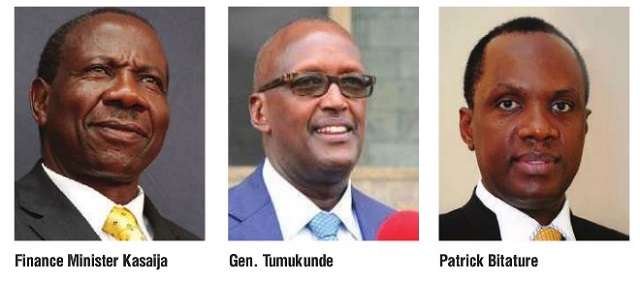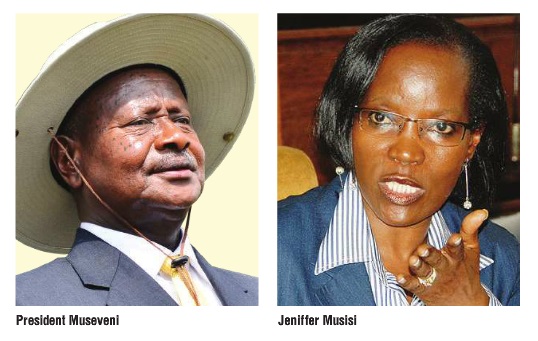
Tumukunde was given billions to first sort out his debts and even more billions to run the campaign. After the campaigns, he was rewarded with the post of security minister having spent almost a decade outside Museveni’s government following a fallout that resulted from him publicly criticising Museveni.
Saleh has held a few public events at Serene Suites.
For instance, around December 2014, he presided over a drive to fundraise for aid for the refugees of South Sudan under his initiative called AfriAid. Central Bank Governor Tumusiime Mutebile, renowned preacher Pastor Robert Kayanja, tycoon Godfrey Kirumira and Ampumuza attended the event.
It is also at this hotel that Saleh first presented Christopher Aine, the former head of security to former Prime Minister, Amama Mbabazi, to the media after Aine had disappeared in the middle of the campaigns.
Despite efforts by police to pursue Aine for arrest, Saleh made sure nobody touched him, and is now also based at the hotel where he works for the President’s brother. Apart from Aine, Saleh is also assisted by Sarah Kagingo, Juma Seiko and artist Daniel Kyeyune, aka Raggae Dee who beat Francis Babu in the ruling party primaries only to be beaten by Elias Lukwago to the Kampala Lord Mayor’s seat.
Sources say Ragga Dee was asked to work with Saleh by President Museveni after the elections. Ragga Dee had surprised many who did not take him seriously after beating Babu. He was also deeply involved in initiating the plan for Museveni to use artistes in the campaigns. However, insiders say that the party cash machinery refused to give him financial assistance in the race against Lukwago.
While Seiko, Raggae Dee and Aine have been working closely with Saleh at Serene Suites for months now, the trio was only publicly seen in action in June as they tried to bring to order a group of boda boda operators, whose leadership Saleh was supposed to meet that day. The meeting was meant to address concerns of boda boda operators but failed because some of their leaders mobilised riders to come and cause chaos. Ragga Dee and Aine could be seen trying to bring them to order in vain.

Saleh’s newpowers
Saleh has also been meeting several interest groups in Kampala including boda boda operators to bolster government support. This is after meeting and hearing their grievances, which are blamed for President Museveni’s poor performance in Kampala. The opposition has always defeated Museveni in Kampala but the gap widened even further in the 2016 election.
For instance, in 2011, Forum for Democratic Change (FDC’s) Kizza Besigye got about 48% andMuseveni about 46% of the vote in Kampala. In 2016, however, Besigye’s vote in Kampala almost hit 70% and Museveni reduced to under 30%.
For instance, business people complained to Saleh that they had lost business as a result of the tough hand of Jeniffer Musisi, the executive director of Kampala Capital City Authority (KCCA). Others complained that the way the government handled Lord Mayor Elias Lukwago was also to blame for Museveni’s poor showing.
Concerned about the tension that emerged following the elections, Saleh’s people reached out to some opposition politicians to calm tempers. It is as a result of these efforts that President Museveni made the decision to appoint notable opposition leaders in Kampala to his cabinet. He appointed Beti Kamya, the president of Uganda Federal Alliance (UFA) as the minister in charge of Kampala and Democratic Party (DP) Florence Nakiwala Kiyingi as the state minister for youth and children affairs.
Saleh also held meetings here with NRM Secretary General Justine Kasule Lumumba and several other MPs after the elections, and some of those who attended those meetings have said that from those interactions it was clear Saleh had been given more powers.
Some say that Saleh is filling the void left by Mbabazi, the President’s former right hand man. Once referred to as ‘super minister,’Mbabazi was the most powerful and most influential politician after Museveni. He almost single-handledly decided who made it on the cabinet list.
Interestingly, Mbabazi wielded more power before he was appointed Prime Minister. His trouble started when he was appointed Prime Minister as this was around the same time President Museveni started getting wind of his presidential ambitions.
The man who replaced Mbabazi—Prime Minister Ruhakana Rugunda—doesn’t quite wield the same influence, the reason some insiders see Saleh as the defacto prime minister given the role he plays in running government.
Some have equated the power he currently wields in the mainstream government to that he wielded in the Uganda People’s Defence Forces (UPDF) in its formative years after President Museveni had just captured power.
Saleh is RO16, meaning that he was the 16th rebel to join Museveni’s outfit in 1981 in which he rose through the ranks to become one of the top commanders in the 1981-86 war and also served as army commander.
He has since retired from the army and officially he is known as senior presidential adviser on Defense affairs and also the coordinator of Operation Wealth Creation. The closest he has been at the heart of Museveni’s mainstream cabinet was as Minister of Microfinance but many now see him as the most powerful government player after Museveni.
****
editor@independent.co.ug
 The Independent Uganda: You get the Truth we Pay the Price
The Independent Uganda: You get the Truth we Pay the Price






Is Salim Saleh playing the “false brother?” General Salim Saleh has always played the mysterious- the enigmatic part of President Museveni’s leadership. He is, his clandestine mover albeit not so smooth. He has been involved in a number of scandals that paint the President in bad light. He was involved in the junk helicopter scandal, in the plundering scandal of the DRC, he has Uganda’s record of being the first and so far the last state Finance Minister in charge of micro-finance. He’s also a senior six graduate in the Swahili language. But today, I am using the term “false brother” as levity to signify a much deeper problem. The pending government bailout of the so called private rich companies has caused a battle of wagging tongues. The latest in the fray being Ofwono Opondo the
Director at the Uganda Media Centre. Hosted on the Capital Gang (a radio talk
programme), Opondo revealed that the Kwagalana group (a loose grouping of the rich) under the auspices of Hon. Amelia Kyabadde (Minister of Trade) met with the President to convince him to direct government buy (nationalise) their shopping arcades. This revelation was after Ramathan Ngobi and Ibrahim Ssemujju suggested that Uganda was facing an economic crisis upon which, Abdul Kantuntu had proposed a dialogue of the key stake holders. I find it an intolerable irony that the “poor” are to bailout the “rich.” If the “Ugandan rich” have become poor, how can they be bailed out by the remaining “not rich Ugandans?” The explanation is, that government is going to take money from the consolidated fund and give it out to individuals and private businesses to advance their personal selfish interests. If
government follows through the bailout plan, it will be confiscating the surplus of the poor to feed the industries and cities of the rich. This calls for an audited plan by the office of the Auditor General. Let there be a sanctioned plan by Parliament on how government can rescue private enterprises. Before the Kwagalana group comes forward with their paunches asking for a financial bailout, let them present their records of accounts to the authorities. My quarrel is not against the principle of government bailing out private companies, it is an ethical argument that the method being applied does not justify it. In 1859, Karl Marx tried to
define what was and wasn’t socialism. In a telling phrase he questioned, ‘Does
a movement or society claiming to be socialist in fact institutionalise the power of the people over the means of production? Or does it rationalise the power of the dominant class over the people?’ In Uganda do we run a free economy or a state economy? The pseudosocialisms is what Marx termed as “false brothers.”
This whole thing has been very interesting for me. The rich-“poor” have made their noise already. We are blaming them, yet they have a problem that has been created over 30 years. Now, the wonderful working/middle class small traders are comfortable. They think its just fine. Maybe they do not have debts, I hope the salary loans from banks, the multiple debts from money lenders, debts from micro finances, debts from markets for just buying food are all being managed well. Should I list it all, mortgage loans, car loans, personal loans, moneylender loans, etc all by one person!!!! Search your entire wardrobe guys and then see whether we are heading to a proper direction. Is this an individual problem now or it had better become of Very serious Public concern. I am talking about the rest apart from the rich who have made a move!!!! You here of a serious debt crisis and your are probably part of it (running to borrow from money lenders to buy just food!!!) and you are remaining silent. I rest my case.